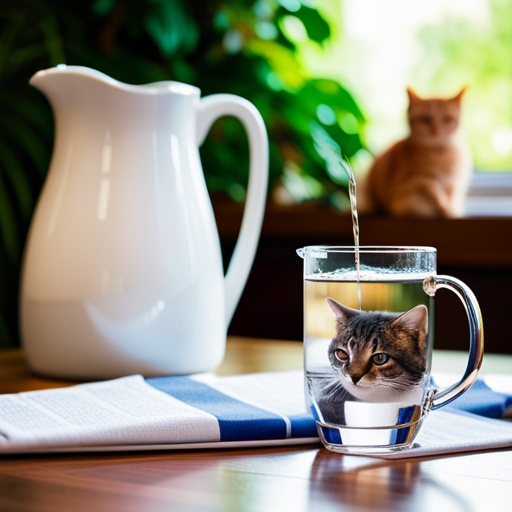As a cat owner, you know that your feline friend deserves the best when it comes to their health and wellbeing. One of the most important aspects of their care is providing them with clean and safe water. While tap water may be convenient, it can contain harmful chemicals that can be detrimental to your cat’s health.
This is where Brita filtered water comes in – it is a safe and inviting option that can benefit your cat in numerous ways. Not only does Brita filtered water remove harmful chemicals like chlorine and hydrogen sulfate, but it also provides your cat with clean and refreshing water that they will love.
The benefits of Brita filtered water for cats are numerous and can improve their overall health and wellbeing. In this article, we will explore the benefits of Brita filtered water for cats and discuss what you need to know before giving it to your furry friend.
So, sit back, relax, and learn how Brita water can help keep your cat healthy and happy.
Key Takeaways
– Brita filtered water is safe and healthier for cats than tap or well water, as it removes harmful chemicals like chlorine and hydrogen sulfate that can cause gastrointestinal problems in cats.
– Proper hydration supports a cat’s bodily functions and helps it thrive and live an active life, and Brita filtered water is tasteless and inviting for cats.
– Boiling tap water before filtering and considering supplementation for cats are things to know before giving them Brita water, as Brita filters not only remove dangerous heavy metals but can also reduce the concentration of beneficial minerals and metals such as iron.
– Some cats may not like filtered water, and it’s important to let them choose between both regular and filtered water first, while also watching for any allergic reactions from cats and if they actually like the taste of Brita filter water.
Is Brita water safe?
You’ll be happy to know that Brita filtered water is safe for your cat. Brita filters use ion exchange, activated carbon, and micro mesh filtration to purify water, removing harmful chemicals like chlorine and heavy metals. This means that your cat can enjoy tasteless and inviting hydration without any worries.
However, it’s important to watch out for potential allergies. Brita water filtration system uses activated carbon treatment derived from coconut shells, so cats allergic to coconut may experience allergic reactions. If you notice any allergic reactions in your cat after switching to Brita water, consider alternative options or switching back to unfiltered water.
Benefits of Brita filtered water
Drinking filtered water can improve your feline friend’s overall health by removing harmful chemicals and particles that can cause gastrointestinal problems and dehydration. Brita filters use a combination of ion exchange, activated carbon, and micro mesh filtration to purify water. Ion exchange removes heavy metals like lead, copper, and cadmium, while activated carbon removes organic compounds, chlorine, and hydrogen sulfide. Micro mesh filtration removes particles like dirt, sand, and sediment. By removing these harmful substances, Brita water can help keep your cat healthy and hydrated.
The importance of hydration for cats cannot be overstated. Proper hydration supports a cat’s bodily functions and helps it thrive and live an active life. Encouraging your cat to drink more water can prevent health issues like urinary tract infections, kidney disease, and dehydration. While Brita filtered water is a great option for your cat, there are alternatives to consider. Boiling tap water before filtering can remove bacteria and viruses that may be present. Adding dietary supplements to your cat’s diet can also help them get the right amount of minerals and nutrients for a healthier life. Ultimately, it’s important to let your cat choose between regular and filtered water and watch for any allergic reactions or preferences they may have.
Considerations and precautions
Before switching to filtered water for your feline friend, it’s important to consider potential allergies and mineral deficiencies.
While Brita filtered water is safe and healthy for cats, it’s important to note that Brita filters not only remove dangerous heavy metals but can also reduce the concentration of beneficial minerals and metals such as iron. By adding dietary supplements to your cat’s diet, you can help them get the right amount of minerals and nutrients for a healthier life.
Another consideration before giving your cat Brita water is to boil tap water before filtering. Brita filters do not remove all pathogens from water, so boiling water can kill bacteria and viruses that may be present.
Additionally, some cats may not like filtered water, so it’s important to let them choose between both regular and filtered water first. Watch for any allergic reactions from cats and if they actually like the taste of Brita filter water.
If your cat is allergic to coconut, which is used in Brita filters’ activated carbon treatment, then consider switching back to unfiltered water if allergic reactions occur.
Conclusion
So there you have it, Brita filtered water can be a great option to provide your cat with clean and safe water that’s free from harmful chemicals.
Not only does it remove impurities, but it also makes the water taste better and fresher, which can entice your picky feline friend to drink more water.
However, it’s important to remember that Brita filtered water isn’t a replacement for proper veterinary care.
If you notice any changes in your cat’s behavior or health, it’s always best to consult with a veterinarian.
With proper care and attention, your cat can enjoy the benefits of clean and safe water with Brita filtration.




